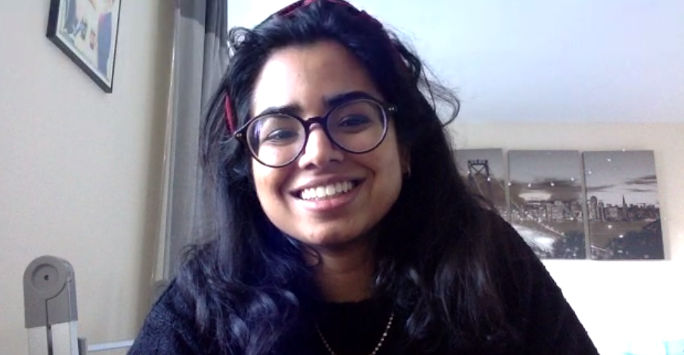
Student doctor Natasha Varshney was busy in the lab when a supervisor pulled her aside and gave her some news that would send her 2020 on a whole new path.
Year 5 Student Doctor Natasha Varshney logs on for our Zoom chat following a shift at Warrington Hospital where she has been thoroughly enjoying her placement. “It’s such a great district general. Everyone is so friendly and willing to teach.”
Natasha was in the lab, deep into her Master of Research intercalated degree, when the news came that the University’s labs would be closing and procured for COVID research and testing.
“It was quite abrupt to say the least. It's so strange looking back now as you were obviously hearing about COVID but it somehow all seemed so far away. But all of a sudden, things just went from 0 to 100.”
“I was still collecting data and had a lot of key information that was missing. It was quite heart breaking that last day. Part of my research was to actually grow cells and I had gotten pretty good at it.” She says, smiling. “All these cells had grown so beautifully. It felt awful to stand there with this squirt gun killing them all off.”
Natasha headed down to the family home in Kent, not thinking for a moment she would remain there until September.
Back home, Natasha found herself filled with awe and pride at the University’s response to the pandemic and seeing her fellow students, now in their fifth year of the MBChB programme, stepping into SubFy1 roles.
“The School of Medicine was the first to create this brand-new role and it was amazing to see the year 5s doing their bit for patients and NHS staff. I have so much respect for them.”
Inspired by her colleagues out on the frontline, Natasha didn’t have to look far for a way to help. Her local hospital run by Maidstone & Tunbridge Wells NHS Trust was looking for support in healthcare assistant (HCA) roles. Natasha applied and after interviews, 2 weeks of training and a week’s induction she was on the bank rota.
“It’s honestly the hardest thing I have ever done. There’s so much to a nursing role that you can take for granted. Just think about things like patient washes. I was helping gentleman shave, brushing teeth. Not to mention turns for elderly patients. These are things I had seen every day at the hospital but from the other side. I learned just how hard nurses work.”
Being on the bank rota meant Natasha was moving around between different areas. One shift covering A&E, another on the respiratory ward. The part Natasha found most challenging was working with end-of-life patients.
“That was really difficult for me. I felt unworthy really. Why should they be spending their last moments with me, a stranger, and not a granddaughter or other loved-one.“
It gets Natasha thinking about her decision to intercalate. “I would be on placement in a hospital or GP surgery and encounter a mother who had just suffered a miscarriage or a patient who had lost their job and was feeling hopeless. It got me wondering if I was mature enough to handle those conversations. Well, after this year I can see how much I have grown.”
“That’s something you’re not necessarily told or aware of in your first year, just how much you will grow up over the course of the programme. You will find yourself consoling patients who have just been given six months to live or families who are grieving and you will do it, and do it well.”
Natasha is extremely grateful for her HCA experience, something she recommends to any fellow student. “I just know that it will make me a better doctor.”
Her HCAing days have set her up for some additional support work Natasha has just signed up for now she’s back in the North West. There are certainly plenty of ways to support during this wave of the pandemic.
“Things are really busy right now over at Warrington and there’s definitely a tiredness in the air but also a sense of looking forward to the Summer and the promise of things starting to look a little better. Plus, anyone who is coming into the NHS is made of absolute grit, so you are just seeing that in action.”
Discover more
- Learn about the study programmes available in the School of Medicine
- Follow the School of Medicine on Facebook, Twitter and Instagram